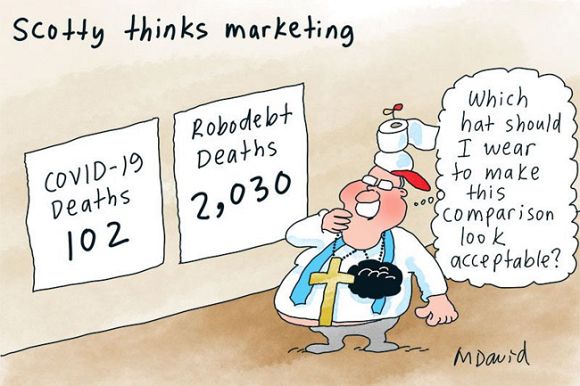The exposure of criminality behind the Robodebt scheme and the distress caused to its victims should highlight the need for more sympathy towards those living in poverty, writes Bilal Cleland.
IF YOU HAVE BEEN forced to contact Centrelink in the past decade or so, you would be aware of how unwelcoming and difficult it is to deal with.
The phone is left ringing until you give up and when a visit to the office is necessary, queues and waiting for lengthy periods is the experience.
The staff are overstretched and try to be helpful but the whole Centrelink enterprise is underfunded and poorly administered at the top. It has been poorly served by a string of ministers who we hope are included in the sealed section of the Robodebt Royal Commission Report.
The assumption, which seems to have been passed down from Victorian England, is that you are trying to get something for nothing.
The Prosperity Gospel
This old-fashioned approach to welfare has been revived by the spread of the insidious tumour of the “Prosperity Gospel” or the “health and wealth gospel,” from a Pentecostal base in the USA.
It is not a mainstream Christian approach and an American Christian website, The Gospel Coalition, analyses this arrogant attitude:
‘In the forefront is the doctrine of the assurance of “divine” physical health and prosperity through faith. In short, this means that “health and wealth” are the automatic divine right of all Bible-believing Christians and may be procreated by faith as part of the package of salvation, since the Atonement of Christ includes not just the removal of sin, but also the removal of sickness and poverty.’
This attracted many of the impoverished, offering an illusory path to prosperity while also massaging the egos of the rich.
It affirmed ‘the religious and spiritual legitimacy of wealth accumulation and reinforce a worldview in which financial success is an indicator of moral soundness’.
The undeserving poor
The idea that prosperity and goodness are linked goes with the notion of the undeserving poor:
‘Poverty researchers and activists have to battle against an ideological tide which insists that if you are in poverty it is either your own fault for not trying hard enough to get a job, or for failing to acquire the skills that would qualify you for a better-paid job.’
That goes with the old Tory idea that the poor have no claim to support:
‘And if it is no one’s fault but your own, you have no justified claims against others or the state. At most, we might give assistance out of the goodness of our hearts, but there are no claims of right or justice.’
By 2023, all but the deluded understand poverty is linked to ‘the state of the economy, government policy regarding minimum wage, unemployment benefits, housing support, income support and the provision of public services’.
Unfortunately, the notion of the undeserving poor is not limited to the more excited of the evangelicals. Even the former Archbishop of Canterbury, Lord Carey, attacked his fellow bishops for resisting cutting back on the welfare system.
Mainstream Islam, Christianity and the Hebrew Bible have very different interpretations:
‘Abu Darda reported: The Prophet Muhammad said, “Seek out the vulnerable for me, for you are only given provision and divine support due to your care for the vulnerable”.’
This attitude still exists as a 2019 survey of American Muslims indicated. They are significantly more likely than the general public to believe that poverty is primarily due to circumstances beyond one’s control vs. an individual’s bad choices.
James, the brother of Jesus, in his epistle, wrote:
‘Now listen, you rich people, weep and wail because of the misery that is coming on you. Your wealth has rotted and moths have eaten your clothes. Your gold and silver are corroded. Their corrosion will testify against you and eat your flesh like fire.’
In The Gospel according to Matthew, it is written:
‘And the King will answer them, “Truly, I say to you, as you did it to one of the least of these my brothers, you did it to me”.’
The Torah records:
‘If among you, one of your brothers should become poor, in any of your towns within your land that the Lord your God is giving you, you shall not harden your heart or shut your hand against your poor brother, but you shall open your hand to him and lend him sufficient for his need, whatever it may be.’
The Robodebt Royal Commission Report
Commissioner Catherine Holmes, SC was scathing in her report to the Government.
She spoke truth to power:
Politicians need to lead a change in social attitudes to people receiving welfare payments.
The evidence before the commission was that fraud in the welfare system was minuscule, but that is not the impression one would get from what ministers responsible for social security payments have said over the years.
Anti-welfare rhetoric is easy populism, useful for campaign purposes.
Discussing the possible approaches to welfare, she hit the nail on the head.
One approach is to understand that at times people will need temporary support in difficult situations and that is provided with respect for their dignity.
Holmes wrote:
An alternative approach is to regard those in receipt of social security benefits as a drag on the national economy, an entry on the debit side of the budget to be reduced by any means available: by casting recipients as a burden on the taxpayer, by making onerous requirements of those who are claiming or have claimed benefit, by minimising the availability of assistance from departmental staff, by clawing back benefits whether justly or not, and by generally making the condition of the social security recipient unpleasant and undesirable.
The Robodebt scheme exemplifies the latter.
This encapsulates the approach for a decade under the L-NP Abbott-Turnbull-Morrison governments and it has become part of the culture in Centrelink.
Some 443,000 Australians received false and illegal Robodebt notices. The ABC placed several of their stories online under Robodebt case studies.
Triple J Hack claimed in 2019, according to data released by the Department of Human Services, that more than 2030 people died after receiving a Centrelink Robodebt notice:
‘Of those, 429 - roughly one-fifth - were aged under 35. The figures cover a period from July 2016 to October 2018.’
‘You don't have to read the sealed section of the report to know that a lot of people are going to face some dire consequences as a result of their actions.’
The spread in some Christian circles of the Prosperity Gospel, combined with traditional Tory values of serving the rich and belabour the poor, has extended the life of the mindset, still embedded in so many of our institutions, that welfare is something bad and should not be required if people were more responsible.
The same people usually oppose unions of working people, fight wage increases and oppose equitable taxation, opting in the main for indirect tax which is a burden on the poor and the removal of regulations which they call “red tape”.
Robodebt and its accompanying distress for welfare recipients, and hopefully for those corrupt politicians and public servants who now face prosecution, should mark a watershed in official attitudes to those citizens who may at times require welfare support.
Bilal Cleland is a retired secondary teacher and was Secretary of the Islamic Council of Victoria, Chairman of the Muslim Welfare Board Victoria and Secretary of the Australian Federation of Islamic Councils. You can follow Bilal on Twitter @BilalCleland.
Related Articles
- CARTOONS: 'Robodenial!' — The new Coalition quiz show
- Robodebt crimes: Who should pay and how?
- EDITORIAL: Robodebt crimes — who should pay and how?
- Centrelink bogus debts: How far can the vulnerable be pushed before they break? FLASHBACK 2017
- Morrison, Porter, Tudge: The Robodebt rogues gallery
 This work is licensed under a Creative Commons Attribution-NonCommercial-NoDerivs 3.0 Australia License
This work is licensed under a Creative Commons Attribution-NonCommercial-NoDerivs 3.0 Australia License
Support independent journalism Subscribe to IA.

















